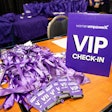
Whether an event is for 30 attendees or 300,000, safety should always be the top priority for planners. That means any event or meeting needs to have the resources to handle medical emergencies—something that attendees are arguably more aware of than ever since the onset of COVID-19.
"If anything positive came out of the pandemic, it's that there's a new awareness of people's personal health," says Andrew Morton, CEO of Bloom Health Partners, an occupational health and technology provider based in Vancouver. Bloom Health works with a wide variety of industries—from manufacturing to Hollywood production studios to large-scale sporting events—to provide health and safety solutions, including COVID-19 testing.
Recent events—including mass shootings in Uvalde, Texas, and in Highland Park, Ill., as well as the attack on Salman Rushdie earlier this month during an event in New York—are also keeping on-site care and emergency planning top of mind.
Along with Morton, we tapped John Whitney of Emergency Concierge International, a full-service emergency management firm that specializes in events and meetings, to share some pivotal advice on getting a plan started.
"My wife and some of my close friends are in the [events] industry," Whitney says. "I want people to take it seriously and and really provide for the safety of their attendees."
1. Do determine whether or not you have the bandwidth.
Emergency Concierge offers on-site services because, as Whitney puts it, he knows that "planners are already so taxed." Sometimes, it's not feasible to add a detailed, adequate security plan into the mix in-house.
"If you truly don't have the bandwidth to handle it, you need to get help from someone in doing it—whether that's someone on your team you'll appoint to do it, or you hire a company like ours who comes in and builds you a template to be able to use for future events, or we just do it for you per event," Whitney says. "You really have to evaluate your bandwidth, and if you decide you do have the bandwidth, you want to take it on, you need to get educated."
2. Do challenge your venues.
One way to get educated is to work very closely with your venue. Whitney explains that when working with clients, his team finds that hesitation in working with them often stems from an over-reliance on venue security—that it's "already taken care of."
"My recommendation is always you need to check and to make sure [that it is taken care of]," he says. "Sometimes the venue's interest is in protecting the venue. So if you and your group [are] evacuated out on the street, the venue is covered, but who is taking care of the group on the street? And that's not to diminish the value of the venue components—we work very seamlessly with those. A lot of people just overestimate that, or they don't see the plan."
If a venue says they have a security plan covered, respectfully challenge the venue and ask to review it, to see how it's integrated, and to ask questions if needed.
3. Don't take the path of least resistance.
"Never assume someone has it handled—you have to confirm it," Whitney notes.
Expanding on this notion, Whitney urges planners to "trust but verify": "Sometimes when we talk to companies, we're told 'we have someone that handles our security.' OK, what do they do? 'They deal with the the executives.' OK, so if there's an issue or an emergency at one of your events, that person takes care of the executives—who takes care of everybody else? 'Well, we never really thought about that.'"
4. Do check in on your staff.
The key to a successful event is the people putting it on, says Bloom Health Partners' Morton.
"Guest management starts with the people working the event, and if the people working the event feel like they've got a good safety net there—whether proactive or reactive care—and they feel like they're well taken care of, then you're going to have a much more successful event," Morton says.
Along with an on-site nurse practitioner or physician assistant, Morton also recommends Telehealth services for staff and attendees alike. It's a quick and efficient way to access a doctor's diagnosis or expertise remotely. It can save time, be more affordable, and also work in tandem with on-site medical services.
5. Don't devalue the significance of your event.
Remember that an emergency plan can be scaled to the size and scope of your event. "I do talk to planners sometimes who say that their event is not high risk," Whitney explains. "But every event is high risk. Anytime you have a large gathering of people—and large can be 30 people—it is high risk, period. It doesn't take much to have a dramatic impact."
Whitney cites the 2019 mass shooting at the Gilroy Garlic Festival in Gilroy, Calif., as an example of the randomness of these incidents. So it's paramount to build a plan for every event, no matter the size. "You're better off because of the planning—it's not just about the document," Whitney says. "The planning prepares you to respond better to the incident."



















